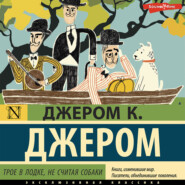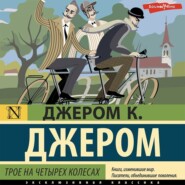По всем вопросам обращайтесь на: info@litportal.ru
(©) 2003-2024.
✖
The Second Thoughts of an Idle Fellow
Настройки чтения
Размер шрифта
Высота строк
Поля
“I don’t know what it is about this class of man. One asks oneself afterwards why one didn’t knock his hat over his eyes and run his head into the nearest horse-trough. But at the time one listens to them. I got a pint of old ale in a hand-bowl, and brought it out. About half-a-dozen chaps were standing round, and of course there was a good deal of chaff.
“‘You’re starting him on the downward course, Jim,’ says one of them. ‘He’ll take to gambling, rob a bank, and murder his mother. That’s always the result of a glass of ale, ’cording to the tracts.’
“‘He won’t drink it like that,’ says another; ‘it’s as flat as ditch water. Put a head on it for him.’
“‘Ain’t you got a cigar for him?’ says a third.
“‘A cup of coffee and a round of buttered toast would do him a sight more good, a cold day like this,’ says a fourth.
“I’d half a mind then to throw the stuff away, or drink it myself; it seemed a piece of bally nonsense, giving good ale to a four-year-old pony; but the moment the beggar smelt the bowl he reached out his head, and lapped it up as though he’d been a Christian; and I jumped into the cart and started off, amid cheers. We got up the hill pretty steady. Then the liquor began to work into his head. I’ve taken home a drunken man more than once and there’s pleasanter jobs than that. I’ve seen a drunken woman, and they’re worse. But a drunken Welsh pony I never want to have anything more to do with so long as I live. Having four legs he managed to hold himself up; but as to guiding himself, he couldn’t; and as for letting me do it, he wouldn’t. First we were one side of the road, and then we were the other. When we were not either side, we were crossways in the middle. I heard a bicycle bell behind me, but I dared not turn my head. All I could do was to shout to the fellow to keep where he was.
“‘I want to pass you,’ he sang out, so soon as he was near enough.
“‘Well, you can’t do it,’ I called back.
“‘Why can’t I?’ he answered. ‘How much of the road do you want?’
“‘All of it and a bit over,’ I answered him, ‘for this job, and nothing in the way.’
“He followed me for half-a-mile, abusing me; and every time he thought he saw a chance he tried to pass me. But the pony was always a bit too smart for him. You might have thought the brute was doing it on purpose.
“‘You’re not fit to be driving,’ he shouted. He was quite right; I wasn’t. I was feeling just about dead beat.
“‘What do you think you are?’ he continued, ‘the charge of the Light Brigade?’ (He was a common sort of fellow.) ‘Who sent you home with the washing?’
“Well, he was making me wild by this time. ‘What’s the good of talking to me?’ I shouted back. ‘Come and blackguard the pony if you want to blackguard anybody. I’ve got all I can do without the help of that alarm clock of yours. Go away, you’re only making him worse.’
“‘What’s the matter with the pony?’ he called out.
“‘Can’t you see?’ I answered. ‘He’s drunk.’
“Well, of course it sounded foolish; the truth often does.
“‘One of you’s drunk,’ he retorted; ‘for two pins I’d come and haul you out of the cart.’
“I wish to goodness he had; I’d have given something to be out of that cart. But he didn’t have the chance. At that moment the pony gave a sudden swerve; and I take it he must have been a bit too close. I heard a yell and a curse, and at the same instant I was splashed from head to foot with ditch water. Then the brute bolted. A man was coming along, asleep on the top of a cart-load of windsor chairs. It’s disgraceful the way those wagoners go to sleep; I wonder there are not more accidents. I don’t think he ever knew what had happened to him. I couldn’t look round to see what became of him; I only saw him start. Half-way down the hill a policeman holla’d to me to stop. I heard him shouting out something about furious driving. Half-a-mile this side of Chesham we came upon a girls’ school walking two and two – a ‘crocodile’ they call it, I think. I bet you those girls are still talking about it. It must have taken the old woman a good hour to collect them together again.
“It was market-day in Chesham; and I guess there has not been a busier market-day in Chesham before or since. We went through the town at about thirty miles an hour. I’ve never seen Chesham so lively – it’s a sleepy hole as a rule. A mile outside the town I sighted the High Wycombe coach. I didn’t feel I minded much; I had got to that pass when it didn’t seem to matter to me what happened; I only felt curious. A dozen yards off the coach the pony stopped dead; that jerked me off the seat to the bottom of the cart. I couldn’t get up, because the seat was on top of me. I could see nothing but the sky, and occasionally the head of the pony, when he stood upon his hind legs. But I could hear what the driver of the coach said, and I judged he was having trouble also.
“‘Take that damn circus out of the road,’ he shouted. If he’d had any sense he’d have seen how helpless I was. I could hear his cattle plunging about; they are like that, horses – if they see one fool, then they all want to be fools.
“‘Take it home, and tie it up to its organ,’ shouted the guard.
“Then an old woman went into hysterics, and began laughing like an hyena. That started the pony off again, and, as far as I could calculate by watching the clouds, we did about another four miles at the gallop. Then he thought he’d try to jump a gate, and finding, I suppose, that the cart hampered him, he started kicking it to pieces. I’d never have thought a cart could have been separated into so many pieces, if I hadn’t seen it done. When he had got rid of everything but half a wheel and the splashboard he bolted again. I remained behind with the other ruins, and glad I was to get a little rest. He came back later in the afternoon, and I was pleased to sell him the next week for a five-pound-note: it cost me about another ten to repair myself.
“To this day I am chaffed about that pony, and the local temperance society made a lecture out of me. That’s what comes of following advice.”
I sympathized with him. I have suffered from advice myself. I have a friend, a City man, whom I meet occasionally. One of his most ardent passions in life is to make my fortune. He button-holes me in Threadneedle Street. “The very man I wanted to see,” he says; “I’m going to let you in for a good thing. We are getting up a little syndicate.” He is for ever “getting up” a little syndicate, and for every hundred pounds you put into it you take a thousand out. Had I gone into all his little syndicates, I could have been worth at the present moment, I reckon, two million five hundred thousand pounds. But I have not gone into all his little syndicates. I went into one, years ago, when I was younger. I am still in it; my friend is confident that my holding, later on, will yield me thousands. Being, however, hard-up for ready money, I am willing to part with my share to any deserving person at a genuine reduction, upon a cash basis. Another friend of mine knows another man who is “in the know” as regards racing matters. I suppose most people possess a friend of this type. He is generally very popular just before a race, and extremely unpopular immediately afterwards. A third benefactor of mine is an enthusiast upon the subject of diet. One day he brought me something in a packet, and pressed it into my hand with the air of a man who is relieving you of all your troubles.
“What is it?” I asked.
“Open it and see,” he answered, in the tone of a pantomime fairy.
I opened it and looked, but I was no wiser.
“It’s tea,” he explained.
“Oh!” I replied; “I was wondering if it could be snuff.”
“Well, it’s not exactly tea,” he continued, “it’s a sort of tea. You take one cup of that – one cup, and you will never care for any other kind of tea again.”
He was quite right, I took one cup. After drinking it I felt I didn’t care for any other tea. I felt I didn’t care for anything, except to die quietly and inoffensively. He called on me a week later.
“You remember that tea I gave you?” he said.
“Distinctly,” I answered; “I’ve got the taste of it in my mouth now.”
“Did it upset you?” he asked.
“It annoyed me at the time,” I answered; “but that’s all over now.”
He seemed thoughtful. “You were quite correct,” he answered; “it was snuff, a very special snuff, sent me all the way from India.”
“I can’t say I liked it,” I replied.
“A stupid mistake of mine,” he went on – “I must have mixed up the packets!”
“Oh, accidents will happen,” I said, “and you won’t make another mistake, I feel sure; so far as I am concerned.”
We can all give advice. I had the honour once of serving an old gentleman whose profession it was to give legal advice, and excellent legal advice he always gave. In common with most men who know the law, he had little respect for it. I have heard him say to a would-be litigant —
“My dear sir, if a villain stopped me in the street and demanded of me my watch and chain, I should refuse to give it to him. If he thereupon said, ‘Then I shall take it from you by brute force,’ I should, old as I am, I feel convinced, reply to him, ‘Come on.’ But if, on the other hand, he were to say to me, ‘Very well, then I shall take proceedings against you in the Court of Queen’s Bench to compel you to give it up to me,’ I should at once take it from my pocket, press it into his hand, and beg of him to say no more about the matter. And I should consider I was getting off cheaply.”
Yet that same old gentleman went to law himself with his next-door neighbour over a dead poll parrot that wasn’t worth sixpence to anybody, and spent from first to last a hundred pounds, if he spent a penny.
“I know I’m a fool,” he confessed. “I have no positive proof that it was his cat; but I’ll make him pay for calling me an Old Bailey Attorney, hanged if I don’t!”
We all know how the pudding ought to be made. We do not profess to be able to make it: that is not our business. Our business is to criticize the cook. It seems our business to criticize so many things that it is not our business to do. We are all critics nowadays. I have my opinion of you, Reader, and you possibly have your own opinion of me. I do not seek to know it; personally, I prefer the man who says what he has to say of me behind my back. I remember, when on a lecturing tour, the ground-plan of the hall often necessitated my mingling with the audience as they streamed out. This never happened but I would overhear somebody in front of me whisper to his or her companion – “Take care, he’s just behind you.” I always felt so grateful to that whisperer.
At a Bohemian Club, I was once drinking coffee with a Novelist, who happened to be a broad-shouldered, athletic man. A fellow-member, joining us, said to the Novelist, “I have just finished that last book of yours; I’ll tell you my candid opinion of it.” Promptly replied the Novelist, “I give you fair warning – if you do, I shall punch your head.” We never heard that candid opinion.
Most of our leisure time we spend sneering at one another. It is a wonder, going about as we do with our noses so high in the air, we do not walk off this little round world into space, all of us. The Masses sneer at the Classes. The morals of the Classes are shocking. If only the Classes would consent as a body to be taught behaviour by a Committee of the Masses, how very much better it would be for them. If only the Classes would neglect their own interests and devote themselves to the welfare of the Masses, the Masses would be more pleased with them.
The Classes sneer at the Masses. If only the Masses would follow the advice given them by the Classes; if only they would be thrifty on their ten shillings a week; if only they would all be teetotalers, or drink old claret, which is not intoxicating; if only all the girls would be domestic servants on five pounds a year, and not waste their money on feathers; if only the men would be content to work for fourteen hours a day, and to sing in tune, “God bless the Squire and his relations,” and would consent to be kept in their proper stations, all things would go swimmingly – for the Classes.
The New Woman pooh-poohs the Old; the Old Woman is indignant with the New. The Chapel denounces the Stage; the Stage ridicules Little Bethel; the Minor Poet sneers at the world; the world laughs at the Minor Poet.
Man criticizes Woman. We are not altogether pleased with woman. We discuss her shortcomings, we advise her for her good. If only English wives would dress as French wives, talk as American wives, cook as German wives! if only women would be precisely what we want them to be – patient and hard-working, brilliantly witty and exhaustively domestic, bewitching, amenable, and less suspicious; how very much better it would be for them – also for us. We work so hard to teach them, but they will not listen. Instead of paying attention to our wise counsel, the tiresome creatures are wasting their time criticizing us. It is a popular game, this game of school. All that is needful is a doorstep, a cane, and six other children. The difficulty is the six other children. Every child wants to be the schoolmaster; they will keep jumping up, saying it is their turn.

















